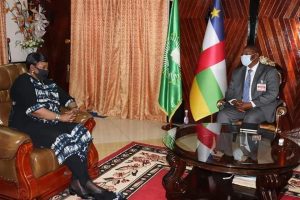By: Thomas Harrington
Journal of Global Rights and Organizations, Lead News Editor
BANGUI, Central African Republic – Fatou Bensouda, International Criminal Court’s (ICC) chief prosecutor in its investigation into the Central African Republic (CAR), met with CAR’s president to discuss the progress of the ICC’s investigations and the upcoming trials of two of the accused. Bensouda concluded her third trip to the CAR since the ICC’s investigations into the conflict began in 2014.

The conflict in the CAR has been going on since March of 2013 and is between ex-Seleka Muslims and anti-Balaka Christians. The fighting has caused the displacement of millions and has resulted in numerous war crimes. While the CAR is predominantly Christian, Seleka rebels overthrew the government in 2013 and held power until 2014. The Seleka president was forced to step down due to international pressure and disbanded the Seleka. Since then, the country has largely been separated into a Muslim North and Christian South. The Christian anti-Balaka militias and ex-Seleka groups have since continued the fighting. The United Nations Security Council and the ICC began investigations into human rights abuses back in 2014, and two cases are about to begin in the ICC.
On February 9th, 2021, the trial against Alfred Yekatom and Patrice-Edouard Ngaïssona, is set to begin in the ICC. The charges against them are a result of the ICC’s investigation, asked for by the CAR’s government, into both sides of the conflict. Yekatom and Ngaïssona are both accused of being anti-Balaka leaders who committed various crimes against humanity and war crimes against Muslim Seleka’s. While the investigation is into both sides of the conflict, the ICC has so far not charged any Seleka fighters.
Alfred Yekatom is an alleged former commander in the anti-Balaka movement who commanded around 3,000 soldiers. He is accused of committing the war crimes of murder, torture, directing attacks against a civilian population, “enlistment and conscription of children under the age of 15 years to participate in hostilities,” amongst other crimes. Yekatom is also accused of multiple crimes against humanity in various locations throughout the CAR.
The ICC stated that Patrice-Edouard Ngaïssona was the National General Coordinator of the anti-Balaka militia, and that he aided, abetted, or otherwise assisted in crimes against humanity and war crimes in the CAR. Ngaïssona was the former head of the CAR’s football federation and committee member of the Confederation of African Football. Because of his position, many in the CAR believed him to be “untouchable.” He was arrested in France in 2018 and charged with similar war crimes and crimes against humanity as Yekatom, with the addition of rape.
The Pre-trial Chamber II joined the cases of Yekatom and Ngaïssona in February of 2019. The decision was made in order to enhance and expedite the proceedings and avoid duplication of evidence. At the time of the joinder, 1,085 victims had been permitted to participate in the hearing through legal representation.
Bensouda’s trip to the CAR, along with the ICC’s launch of an assistance pilot project from the Trust Fund for Victims (TFV), are important visible steps toward justice from the horrific violence from this conflict. The ICC is showing that it is continuing to keep its promise, from 2014, to investigate the crimes against humanity committed in the CAR between the ex-Seleka and anti-Balaka groups.
For more information, please see:
International Criminal Court – Statement of the Prosecutor, Fatou Bensouda – 1 Oct. 2020
AP News – ICC: Former Central African Republic militia leader arrested – 12 Dec. 2018
Aljazeera – UN launches CAR probe to prevent genocide – 10 Mar. 2014
BBC NEWS – Central African football official Ngaïssona faces war crimes trial – 12 Dec. 2018
Reuters – Central African Republic rebels demand partition in Brazzaville talks – 22 Jul. 2014
International Criminal Court – Press Release – 8 Oct. 2020